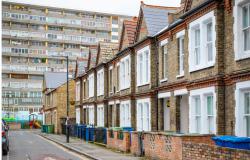

Evictions ban fails victims of abuse
Extending the ban on evictions in rented housing will compound the suffering of victims of domestic violence and anti-social behaviour says the NRLA.
As a result of the decision by the government to prevent any evictions taking place until the end of August, landlords are powerless to take action against tenants committing domestic abuse or making the lives of fellow tenants or neighbours a misery.
According to research last year by the University of Bristol, 38 per cent of victims of domestic abuse live in private rented housing, a higher proportion than any other tenure.
The charity Refuge, which runs the Domestic Violence Helpline, has said that there has been a 66 per cent increase in calls to the helpline during the COVID-19 pandemic.
In cases of domestic violence, landlords will often end the tenancy agreement and offer a fresh one, for the same property, to the victim independent of the abuser.
Let down
The NRLA argues that the ban goes against the spirit of a report by the then Victims Commissioner, Baroness Newlove, who warned last year that “victims of anti-social behaviour are being let down by police, local councils and housing providers.”
The NRLA is calling for the courts to deal urgently and swiftly with cases concerning anti-social behaviour and domestic violence when they are allowed to begin to hear repossession cases.
Ben Beadle, Chief Executive of the NRLA, said: “Extending the evictions ban is not without victims. It leaves landlords powerless to tackle the kind of behaviour that causes untold suffering and hardship for many communities and tenants alike.
“These cases must be given top priority by the courts and their processes enhanced to avoid further delay once they start to deal with possession cases.”
Deep concerns
Since the Government made the decision to further extend the evictions ban, many victims of such behaviour have taken to twitter to express their deep concerns at the move.
Messages included:
“My sister can’t return to the house she owns because the abusive next-door neighbours who rent and have been served a section 21 can’t be evicted – how is that fair?! Meanwhile her mental health suffers.”
“Fantastic. Landlord won’t be able to evict the criminals living below me that are making mines (stet) and my daughters life’s hell. Landlord can’t evict them, police aren’t doing anything. What am I supposed to do now? I own my home I can’t just up and leave.”
“This is a total disaster. I’m living in a shared house with a nightmare tenant. We all want her gone, as does the landlady. Her anti-social behaviour is driving us and the neighbours up the wall. She was due to go on 1st July. I can’t put up with it for another two months.”
“Please don’t make this a blanket ban on evictions. Spare a thought for those of us putting up with anti-social noisy and threatening neighbours who, but for these delays to evictions, would have been gone already. Lockdown is like house arrest next to a rave party for me.”
More information
The NRLA has a five-point plan to help support the private rented sector. It is asking for:
1. A clear statement from the Government re-iterating that those who can pay their rent should do. The eviction ban extension should not be used as an excuse for those with the means but who choose not to pay their rent.
2. Further support for tenants most in need, to pay their rents by:
– Developing government guaranteed interest free, ring-fenced loans for tenants to solely pay for all or part of their rent. The funds would be paid directly to the landlord to cover the rent due. The tenant would pay back the loans over a number of years.
– Increasing the Local Housing Allowance to the 50th percentile.
– Converting Universal Credit advances into grants.
– Suspending the Shared Accommodation Rate for under 35s as called for by the Social Security Advisory Committee.
3. Support for landlords who face financial hardship as a result of the impact of coronavirus by providing compensation from the Government for those who: (i) had an order to repossess a property granted by the courts at the time of lockdown but who have not been able to execute it because of the evictions moratorium; and (ii) have lost rent or incurred damage to property as a result. Where rent arrears can be clawed back, landlords should then make suitable repayments to the Government.
4. The courts to prioritise repossession cases when they begin again. Priority should be given to cases where tenants are committing anti-social behaviour or domestic violence, possession cases which were started prior to the lockdown but were then paused, cases where rent arrears were built prior to the lockdown and instances of tenants deliberately not paying their rents despite having the means to do so.
5. Clear plans to ensure courts process legitimate possession claims more swiftly. Prior to lockdown in the first quarter of 2020 the average (mean) time between claims and repossessions taking place for private landlords was 23.6 weeks. This is far too long. Reforms should include making much greater use of deciding cases electronically or through mediation. The Government’ had consulted on developing a housing court closed in January 2019 but no response has yet been provided to it.

